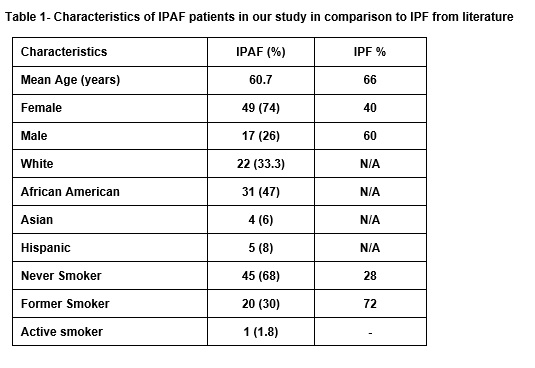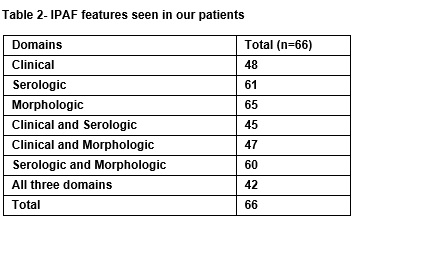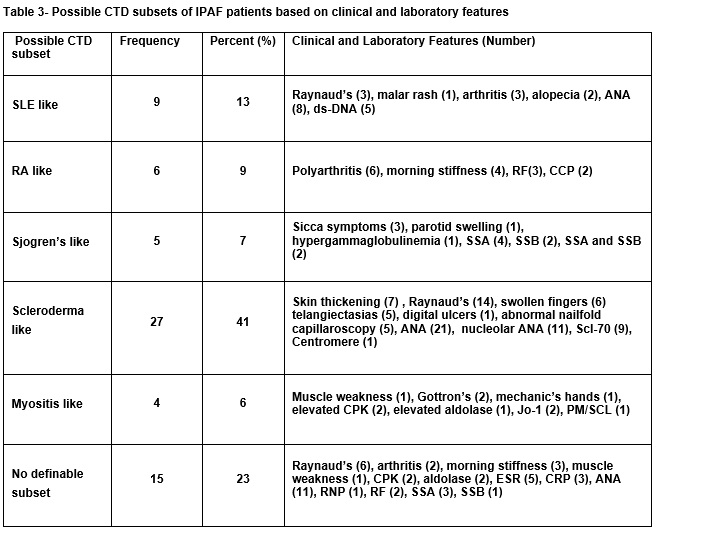Session Information
Session Type: ACR Poster Session C
Session Time: 9:00AM-11:00AM
– Background/Purpose:
Interstitial lung disease (ILD) can be an early manifestation of an occult connective tissue disease (CTD). It is important to separate these patients from Idiopathic pulmonary fibrosis (IPF), since the outcome and treatment are different. Recently, an international task force proposed criteria for patients with ILD and at least one feature from clinical, serologic or morphologic domains, calling it ‘Interstitial Pneumonia with Autoimmune Features (IPAF)’ (Fischer, 2015). We carefully reviewed ILD patients seen since 2008 to see if they had features suggestive of CTDs and also a possible flavor to help define subsets.
– Methods:
We identified 374 patients with ILD who were seen at rheumatology and pulmonary clinics. Patients with clear IPF or a definable CTD were excluded (n=276) and the remaining 98 patients were thoroughly reviewed for the demographic, clinical, laboratory, and radiographic features. Those featured were entered in Excel database and analyzed from different aspects.
– Results:
Of these 98 patients with ILD, 66 met criteria for IPAF, 14 patients met criteria for a CTD, 3 patients had IPF and 15 patients did not meet criteria for IPAF primarily due to lack of rheumatologic evaluation or complete serologic testing. Among 15 patients without IPAF, 4 patients had elevated CPK and aldolase that could not be used towards IPAF criteria. In comparison with IPF, our IPAF patients were younger (mean age 60.7). There were more women and African Americans (74% and 46% respectively) and smoking history did not seem to be a major contributing factor (only 32%), (Table 1). Table 2 describes the features (domains) that led to the diagnosis of IPAF. Among these IPAF patients, 77% had features suggestive of a specific CTD with scleroderma the most frequent at 41% (Table 3). Some patients did not have enough features to suggest a possible CTD (23%).
– Conclusion:
IPAF is an important subgroup of patients who need to be better characterized. These patients are more commonly female and have serologic abnormalities. Further consideration may be helpful to include some other features in the criteria (e.g. elevated muscle enzymes). A large portion of patients with IPAF (77%) appeared to fit into a CTD subgroup which could be helpful in determining the best treatment.
To cite this abstract in AMA style:
Mesdaghinia S, Huapaya JA, Ewarien B, Steen VD. Interstitial Pneumonia with Autoimmune Features (IPAF): Are There Definable Subsets? [abstract]. Arthritis Rheumatol. 2017; 69 (suppl 10). https://acrabstracts.org/abstract/interstitial-pneumonia-with-autoimmune-features-ipaf-are-there-definable-subsets/. Accessed .« Back to 2017 ACR/ARHP Annual Meeting
ACR Meeting Abstracts - https://acrabstracts.org/abstract/interstitial-pneumonia-with-autoimmune-features-ipaf-are-there-definable-subsets/



